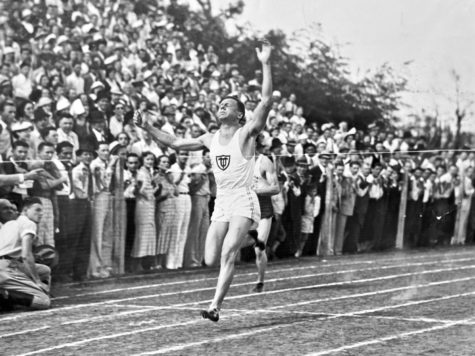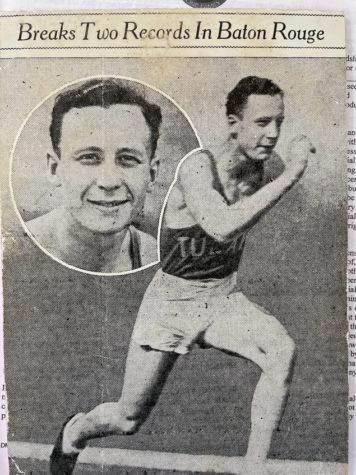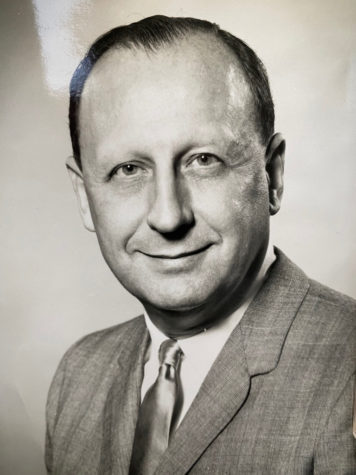Tulane sprinter protested Nazis by boycotting 1936 Berlin Olympics
March 9, 2022

Almost 90 years ago, former Tulane University student, track star and Jewish American Herman Neugass declined his invitation to the U.S. Olympic trials for the 1936 Berlin Summer games out of loyalty to his faith and values.
Born in Magnolia, Mississippi in 1915, Neugass moved to New Orleans as a child where he attended the Isidore Newman School and later, Tulane. He began his college career in tennis, but quickly shifted his attention to track, where his athletic ability began to shine.
Primarily a short distance sprinter, Neugass excelled in both the 100-yard and 220-yard dashes. His blazing speeds earned him the nicknames “Human Bullet” and “Green Wave Express.” Neugass’ reputation came at no surprise considering he tied the world record for the 100-yard dash at 9.4 seconds.
Off the track, Neugass loved Tulane and was as smart in the classroom as he was fast on the track. “He had very high regard for the university. And he did very well. He was [a member of] Phi Beta Kappa [and] won a math medal [within the] math department,” his son Richard Neugass said.
When asking if his father experienced antisemitism at Tulane, Richard remarked, “I never heard of any antisemitic actions or attitudes at the college. There may have been, but he never shared that with me. He was very proud of Tulane, always.”
Herman Neugass also formed a special bond with his track coach, Fritz Oakes. Neugass lost his father when he was 13, but Oakes, who had no children of his own, became an important father figure in his life.

Closely following the successes of the young sprinter, the American Olympic Committee invited Neugass to participate in the 1935 Olympic trials held in Flushing Meadows, New York in anticipation of one of the most controversial Summer Olympic Games ever in Berlin, Germany.
Chosen as the host city in 1931, the 1936 Summer Olympic Games were originally supposed to show the progress of the democratic Weimar Germany in returning to the global stage. Two years after being selected as the host city, Adolf Hitler was appointed Chancellor of Germany and the Nazi Party was selected to lead a coalition government. By 1935, Hitler held a totalitarian grip on Germany and began instituting oppressive laws that primarily targeted Jews.
Intending to use the games for propaganda purposes, Hitler hoped to brandish his reimagined Germany, stronger and more unified than ever. Hitler carefully constructed the nation’s image to downplay the numerous antisemetic and racist laws present in Germany.
As a Jewish athlete, Neugass expressed his strong disapproval of U.S. participation in the antisemetic atmosphere.
One athlete spoke on Neugass’ behalf, claiming Neugass would be in attendance at the trials. Neugass promptly broadcasted his disapproval through a letter written to The Times-Picayune.
“I would not participate in games in any country in which the fundamental principle of religious liberty is violated as flagrantly and as inhumanely as it has been in Germany,” Neugass said. “As an American citizen who believes sincerely in the cardinal tenet of freedom of religious worship embedded in the Constitution of the United States, I feel it to be my duty to express my unequivocal opinion that this country should not participate in the Olympic contests if they are held in Germany.”
Neugass gave up his Olympic dreams despite having a realistic chance at glory in both the 100 and 200-meter dash. In addition to his world record speed for the 100-yard dash, he also went on to win the 220-yard dash at the 1935 Southeastern Conference championships with a timing of 21.7 seconds. Though his time was a second slower than the gold medal time, Neugass would have still qualified for sixth place. But, the 220 yards converts to just over 201 meters, so Neugass may have done even better.
Despite Neugass’ absence, the events that took place at the Olympic games are integral to Neugass’ story. Despite calls from the NAACP to boycott the games, Black sprinters Jesse Owens, Ralph Metcalfe and Mack Robinson — brother of future Brooklyn Dodger Jackie Robinson — still attended.
Owens won gold in four events, including the 100 and 200-meter dashes, with Metcalfe capturing silver in the 100-meter and Robinson silver in the 200-meter.
Neugass raced Owens twice in his collegiate career, losing both times. But according to Richard Neugass, his father adored Owens and met him after the NCAA championships. “They didn’t have a close relationship, but he appreciated the man that Jesse Owens became when he got back [from the Olympics],” Richard Neugass said.
One curious incident was the 4×100-meter relay. The U.S. took seven sprinters, and traditionally, the top three runners would compete in the individual event, while the bottom four would compete in the relay. Among the four relay runners were two Jews who trained for the event until they were replaced on the morning of the race by Owens and Metcalfe. The Americans won the gold comfortably.
“There was a special exhibit at the U.S. Holocaust Museum in 1996, [where] several Jewish athletes were invited. I went in my father’s stead because he had passed, and I met Marty Glickman … ” Richard Neugass said while speaking on this race. “He told me, your dad was right. He took the right stand.”
Long-time advocate for Neugass’ recognition Marc Bowman recalled the parallel between the 1980 Olympic Game boycott and Neugass’ boycott over 40 years prior. President Jimmy Carter invited Neugass to stand with him at the White House Rose Garden in support of the boycott of the Moscow 1980 games following the 1979 Soviet invasion of Afghanistan.
“Jimmy Carter makes a statement and standing next to him is Herman Neugass, exhibiting a different variation of the same principle,” Bowman said. “If you can’t be free [and] you want to invade a country … you have no right to be a host of anything that invites the world community.”
Bowman has been sharing Neugass’ story for nearly 20 years and said he hopes to see Tulane’s acknowledgement of the New Orleans legend.
“What I’d like to see is something that represents Herman so that students could see it all day long and understand that principle is not just a word. Principle is how you act and behave,” Bowman said.

Despite being inducted into the Tulane Athletics Hall of Fame alongside coach Oakes in 1979, many Tulane students are unfamiliar with Neugass’ legacy. Tulane did have a plaque for Neugass, but it is no longer there. According to Richard Neugass, Katrina destroyed the Hall of Fame, and it has yet to be rebuilt or reconstituted.
Currently, the only piece of recognition Neugass has on Tulane’s campus is that his name is listed among Tulane’s All-Americans on a board in one of the offices of the Wilson Center. Despite a storied history, Tulane track and field as a whole only has a few pieces of memorabilia in the building, paling in comparison to what the football, swim and tennis teams have.
Iker Yturralde, sophomore and member of both the track and field and cross country teams, said he did not know about Neugass’ mark on Tulane until recently.
“Learning more about who Herman Neugass was and what he stood for is an inspiration,” Yturralde said. “His story has helped me claim the responsibility of influence I have as a student athlete at Tulane. I am proud to be part of the same team that he was once on.”






















Karen Kahn Weinberg • Mar 10, 2022 at 10:33 am
Moved beyond words by this story! I’m a Newcomb-Tulane ‘75 grad, lettered all 4 years for Newcomb College, and eventually, we were known as “Tulane Womens Tennis Team”. I credit our awesome Coach Linda Parchman with taking us all over the southeast US for matches and inspiring the female athletes of the early – mid-1970’s! There was plenty of segregationist (against blacks, Jews, and anyone seemingly different) felt in some of the Alabama, my home state of Arkansas, Florida, Louisiana, Mississippi, Louisiana, and Texas areas but it was never felt on the tennis court! Karen Kahn Weinberg
Phillip Unger • Mar 10, 2022 at 10:16 am
Inspiring story. Deserves to be more widely shared and more formally recognized at Tulane – perhaps a new plaque or bust.
What happened to Neugass after he left Tulane ? Career, family, Jewish affiliation, etc
Andrew • Mar 10, 2022 at 9:56 am
I have never heard this story. Thanks for a great article.
William Temple Beam Jr • Mar 10, 2022 at 9:24 am
Incredible story. Gives great perspective to the environment Mr. Neugass addressed as a Tulane track star and student. Thank you